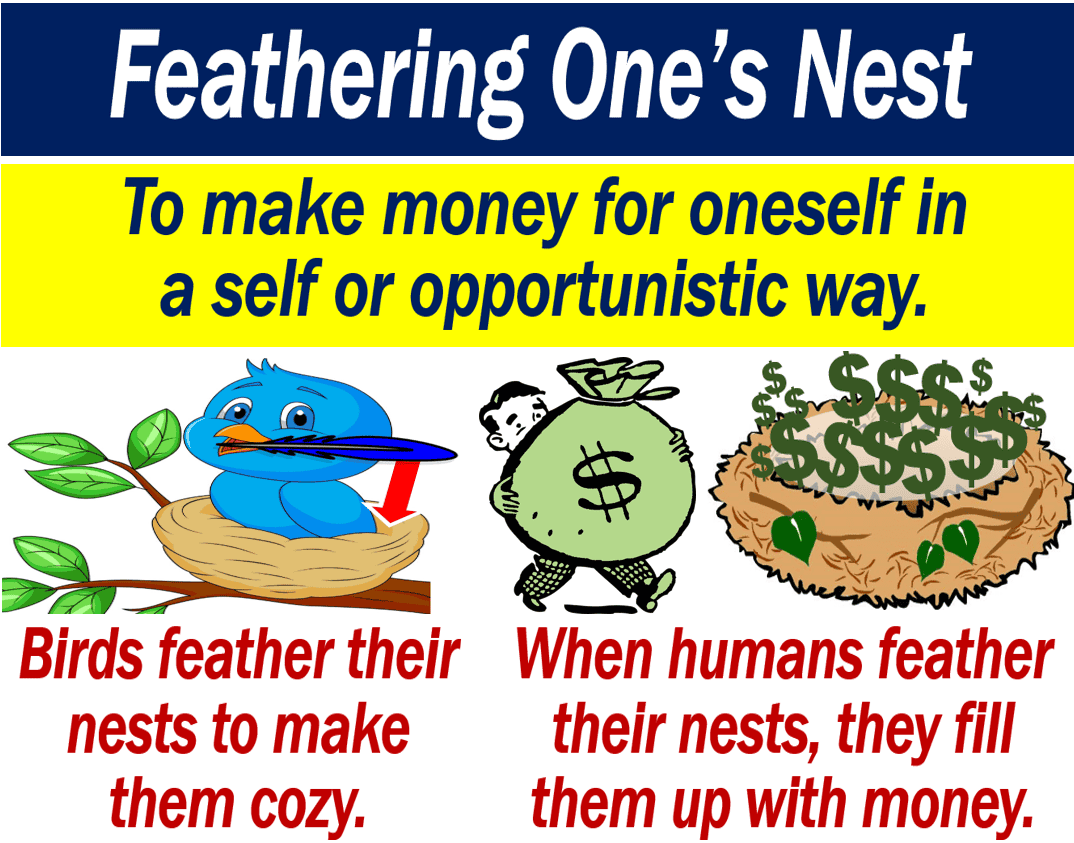What is to feather one’s nest? Definition and examples
To Feather One’s Nest means to take advantage of one’s position, contacts, or available information to get rich. The person who uses the term disapproves of the action, i.e., it is a derogatory term. To feather one’s nest means to get rich in an unethical, unfair, or sometimes even dishonest way.
In other words, the culprit is selfish, opportunistic, and could also be violating regulations or even breaking the law.
When birds make their nests, they line them with feathers, i.e., they feather their nests. They do this to make their nests cozier and more comfortable. Hence the term for humans. However, in the case of humans, ‘feathers’ stands for money or wealth.
Cambridge Dictionary has the following definition of ‘to feather your own nest‘:
“To make yourself rich, especially in a way that is unfair or dishonest.”

Other terms
Here are some terms that mean the same as or similar to “to feather one’s nest.” We have also added an example sentence with each one:
-
To line one’s pocket
Example sentence: “He was accused of using the company’s funds to line his own pockets.”
-
To look out for number one
Example sentence: “In the corporate world, it often seems like everyone is just looking out for number one.”
-
To enrich oneself
Example sentence: “The CEO used insider knowledge to enrich herself before the information went public.”
-
To milk the system
Example sentence: “He found loopholes in the tax laws and milked the system for all it was worth.”
-
To pad one’s wallet
Example sentence: “She took on the high-paying consultancy role primarily to pad her wallet.”
-
To profit off one’s position
Example sentence: “The politician was found to profit off his position by steering contracts to his family’s businesses.”
-
To exploit the gravy train
Example sentence: “Once he became a part of the inner circle, he didn’t hesitate to exploit the gravy train provided by his connections.”
Build up a nest egg
The term ‘to build up a nest egg,’ on the other hand, is not derogatory. If I am building up a nest egg, it means I am saving money for the future, i.e., for retirement or a rainy day.
Put simply; ‘to feather one’s nest’ is bad, but ‘to build up a nest egg’ is good.
Feather one’s nest – example
When a person is feathering their own nest they are taking advantage of a situation or their position. Although the term refers to unethical activity, it does not necessarily mean it is illegal.
-
John Doe retires
Let’s imagine that John Doe has just retired as Blingo’s Secretary of Commerce. Blingo is a fictitious country.
He was Secretary of Commerce for ten years. During that period, he enjoyed prestige and made thousands of influential and wealthy contacts.
Those contacts know that Mr. Doe is familiar with the ins-and-outs of government. He also knows who to talk to in the government to push things through.
-
Mr. Joe joins many Boards
After retiring, Mr. Doe joins the Board of Directors of seven blue chip companies. Blue chip companies are businesses that investors regard as reliable and profitable, i.e., they are the stock market’s top companies.
-
Easy money
Being a Board Member of those companies earns him $350,000 per year. All he has to do is go to four meetings each year in each company. He also introduces top executives to government ministers and powerful civil servants.
Mr. Doe is feathering his nest. He is taking advantage of his previous job and the connections and prestige it gave him.
-
A hypocrite
Many people despise him because he criticized individuals who did this when he was Secretary of Commerce. People say that what he is doing is unethical and hypocritical.
Such actions often erode trust and can tarnish the reputation of individuals in positions of power.
-
Feathering one’s nest legally
This is an example of feathering one’s nest without breaking the law, but behaving opportunistically and selfishly.
Example sentences
Here are some example sentences using “to feather one’s nest,” to help illustrate how this term can be used in different contexts:
- “Despite his humble public persona, it became clear that the mayor was using his influence to feather his nest.”
- “The auditor’s report suggested that the manager had found ways to feather her nest at the expense of the company.”
- “He entered politics to make a difference, but critics say he’s just feathering his nest.”
- “After the scandal, it was evident that she had been feathering her nest through illicit deals.”
- “The community was outraged when they learned the developer was feathering his nest with public funds.”
- “The executive was discreet, but it was common knowledge that he was feathering his nest by endorsing lucrative side deals.”
Educational Video – What is to Feather One’s Nest?
This video presentation, from our YouTube partner channel – Marketing Business Network, explains what ‘To Feather One’s Nest’ means using simple and easy-to-understand language and examples.

